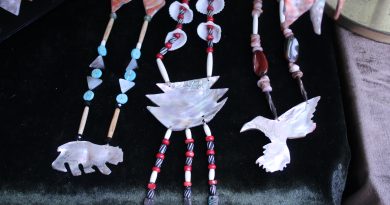Tenure-track Indigenous women from local tribes lead the way in higher education
Photo illustration by Raven Marshall
Indigenous professors in the California State University system aren’t far and wide. The National Center for Education Statistics reports that only 1% of full-time faculty are American Indian/Alaska Native. Behind the Redwood Curtain, things are different.
Humboldt State University has the most number of tenure-track Indigenous women faculty, as well as the highest number of tenure-track Native faculty and staff in the CSU system according to the chair of the Native American Studies department (NAS).
“When I think of education, I think of how I can create these experiences where students not only feel personally connected, but they feel that they’re in a safe environment to be able to explore and to discover this new information and build these new experiences.”
Kishan Lara Cooper, Ph.D
Many of the Indigenous professors teaching at HSU today are descendants of HSU alumni. At HSU, the NAS department is composed of all Indigenous faculty, most of whom are from local tribes.

Cutcha Risling Baldy, Ph.D, is a member of the Hoopa Tribe, and the chair of the NAS department at HSU. Baldy is a tenured professor, with deep roots in the local community. Baldy teaches capstone classes for NAS, a graduate decolonizing methodologies course and dedicates her time to helping make the Food Sovereignty Lab a reality at HSU.
“[Tenure] gives a certain stability to the professors who are doing the work in [the] community,” Baldy said. “As a tenured faculty, we are hired on and we’re going to be here for, hopefully, a long period of time. That means that we can [do] really important community-based work because that takes a while.”
Baldy said that she wants to empower the voices of the most marginalized students who might not envision themselves as academics.
She wants to see a space where marginalized community members empower each other and to be able to do the real work of decolonial movements.

Sara Chase, Ph.D, is a member of the Hoopa Tribe and an assistant professor for the Child Development department. Chase is a tenure-track faculty member who dedicates her time to teaching middle childhood development.
Chase said that she didn’t have her first Indigenous professor until her junior year of college and that it made a huge difference in her life.
“Bringing that Indigenous perspective into anthropology was something that was really important and enlightening for me,” Chase said. “Myself and also Kishan [Lara Cooper]… really do take an Indigenous perspective to understanding and looking at issues of child development.”
Chase hopes that the future of academia will stop catering to the needs of those privileged in society, and focus on centralizing the needs of its underrepresented population.

Kayla Begay, Ph.D, is a member of the Hoopa Tribe and a tenured-track professor in the NAS department. They specialize in linguistics, and offer a course that gives students the chance to study the Indigenous language of their choice, many times ancestral ones.
Begay teaches and specializes in linguistics within the NAS department.
“In my classes I do teach linguistics, because it’s helpful to [access] the documentation and [read] it,” Begay said. “At the same time I’m coming from my background and training with the advocates for Indigenous California new language survival in which we provide, you know, like master apprentice training and immersion. We create immersion settings for ourselves.”
Begay also notes that a lot of the Indigenous roots at HSU are because of Indian Tribal & Educational Personnel Program (ITEPP).
“We have some tribal people because of ITEPP the long history of ITEPP that sometimes it’s intergenerational. Someone came here as a student in the 60s [and] 70s and now their children or grandchildren are a part of the HSU community.”

Kishan Lara Cooper, Ph.D, is a member of the Yurok Tribe, with ancestry in both the Hoopa and Karuk Nations. Cooper is a tenured professor and chair of the Child Development Department. She teaches classes in middle childhood development which centers around those ages 6-12.
Cooper explains that when students don’t have a vested interest in their classes they only retain about 30% of what is taught. To truly retain information, they need to enjoy the subject at hand.
“And so when I think of education,” Cooper said. “I think of how I can create these experiences where students not only feel personally connected, but they feel that they’re in a safe environment to be able to explore and to discover this new information and build these new experiences.”
Cooper argues that tenure is an opportunity to advocate and a responsibility for those who are lucky enough to have it.
“I think [tenure] is having a space to be able to advocate,” Cooper said. “For students, for other faculty, for staff. That’s how I feel it is for me. Testimonial justice leads my life, you know, it’s creating and nurturing spaces for people to be able to express their voice and so I feel like my role oftentimes is in reminding people, others that I work with, to nurture those spaces you know. Not to speak for others, but to nurture spaces for people to speak for themselves in situations.”

Kaitlin Reed, Ph.D is a member of the Yurok tribe, and is currently teaching three sections of Intro to Native American Studies, and has taught Indigenous Peoples History in the U.S. last year (NAS 200). Reed is a tenure track professor, currently working on finishing her book.
Reed thinks that the ways in which people are bound and constricted by the hierarchical process of academia today is problematic.
“I hope to see a revitalization of Indigenous education practices,” Reed said when asked about the future of academia. “My vision for the future, and it might be a while, but that we’re having classes in our own languages.”
Editor’s Note: Kayla Begay was identified as tenured. Begay is tenured-tracked.




